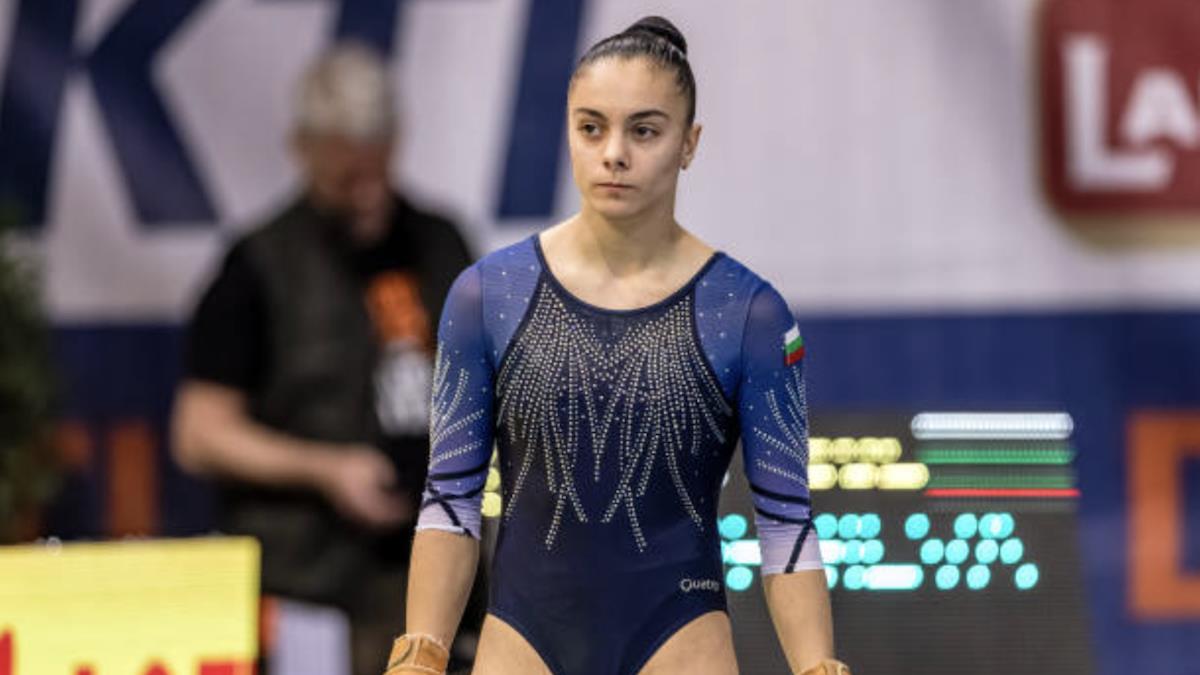
Valentina Georgieva
The 2024 world cup series wrapped up with the fourth and final competition in Doha on Saturday, where a total of 20 athletes earned their tickets to Paris.
Athletes eligible for Olympic berths had to compete at at least three of the four world cup competitions held over the past couple of months with the goal of earning enough points at each to finish in the top two of the overall series rankings. The top two on each apparatus at the conclusion of the series would win the coveted Olympic spots, with Doha offering the final opportunity for athletes to boost their standing.
A total of eight WAG athletes and 12 MAG athletes ultimately qualified through the world cups. On the women’s side, that included An Chang Ok of North Korea and Valentina Georgieva of Bulgaria on vault, Georgia-Rose Brown of New Zealand and Levi Jung-Ruivivar of the Philippines on bars, Nina Derwael of Belgium and Ting Hua-Tien of Taiwan on beam, and Charlize Mörz of Austria and Laura Casabuena of Spain on floor.
Some of these athletes came out of Baku in early March with their spots secure, including Derwael, who earned a perfect 90 points after picking up 30 points on beam at each of the first three competitions, allowing her to skip Doha entirely. But the race came down to the wire for others, including Jung-Ruivivar, who had been several rankings away from one of the top spots on bars with just 44 points going into Doha, though a silver-medal finish and 30 points here allowed her to bypass the rest of the field, putting her into second place in the overall rankings just seven points ahead of Alena Tsitavets of Belarus and Nathalie Westlund of Sweden.
Things also got a bit exciting in the beam and floor battle, as Casabuena finished second on both with 61 points on beam and 75 points on floor. In this case, there was a tie-break to determine on which apparatus Casabuena would officially qualify, with floor coming out the winner and her beam spot then awarded to Ting, who was next in line with 57 points. Had Casabuena qualified on beam instead, the floor spot would have gone to Emma Malabuyo of the Philippines, who seemed pretty likely to earn that spot until she missed the final in Doha and wasn’t able to add to her points total, allowing Casabuena to sneak ahead by just six points after Casabuena earned 30 here along with the bronze medal.
On the men’s side, the Olympic qualifiers included Ryu Sunghyun of South Korea and Aurel Benovic of Croatia on floor, Ahmad Abu Al Soud of Jordan and Nariman Kurbanov of Kazakhstan on pommel horse, Samir Aït Saïd of France and Vahagn Davtyan of Armenia on rings, Shek Wai Hung of Hong Kong and Mahdi Olfati of Iran on vault, Angel Barajas of Colombia and Rasuljon Abdurakhimov of Uzbekistan on parallel bars, and Tang Chia-Hung of Taiwan and Robert Tvorogal of Lithuania on high bar.
Tang was the only MAG athlete to earn a perfect 90 points, but a few others got close, including Abu Al Soud with 85 and Ryu, who didn’t compete in Doha, with 80. There were also many close battles for the second spots, with Nikita Simonov of Azerbaijan coming within two points of earning a spot on rings, Benjamin Osberger of France only three points away on floor, and Lee Chih-Kai of Taiwan coming within seven points on pommels.
The closest separation, however, was on vault, where Olfati with 62 points was just one point ahead of James Bacueti of Australia with 61. Olfati missed the final and didn’t pick up any additional points in Doha after sitting his first vault to earn a zero and finish in last place with a 6.700 average, while Bacueti had a strong performance to finish fifth in the final and earn 20 points. It wasn’t quite enough to take over the lead, though many thought he’d done it after assuming he’d get 25 points due to Audrys Nin Reyes of the Dominican Republic, who finished fourth in the final, not being eligible for points after qualifying to Paris through the all-around at Pan Ams.
However, the FIG clarified last year that all world cup berths would be awarded first, regardless of when the continental qualifiers took place, so even though Pan Ams happened six months earlier and it was clear Nin Reyes would be the continental all-around qualifier for the Americas, he wouldn’t officially be awarded the spot until after the world cups, making him eligible to earn points in Doha.
Doha was the debut meet for Nin Reyes this year, so his 25 points here weren’t nearly enough for him to earn an Olympic spot, but had he competed and earned points throughout the series and finished among the top two, he would have earned an Olympic spot here, which would have them made him ineligible for the Pan Ams spot. Although he wasn’t reaching for an Olympic spot via the world cups, he was still eligible to earn points due to the order of Olympic qualifiers as stated in the rules, and so instead of Bacueti getting 25 points for a total of 66 points – which would have pushed him up to second place – Bacueti was only able to get 20 points for total of 61 points, holding him back to third.
On parallel bars, the third-place finisher, Jossimar Calvo of Colombia, was just two points back from second place and three points away from matching Barajas, his teammate. Had he finished second, he wouldn’t have been eligible to qualify, as the rules allow for only one athlete per country on each apparatus, but going into the Doha match, both Colombians had a legitimate shot of reaching Paris. However, neither ended up making the final, with Barajas not adding any points to his total here, while Calvo was only to pick up 10 in qualifications, which was his lowest among the four meets and also added nothing to his total. To surpass Barajas, he would have needed to at least qualify where Marios Georgiou ended up, in 12th place to earn 14 points after reallocation, but he ended up just over two tenths away from making that happen.
Now one final tangent about how things ended up working out on floor, which highlights the problem of allowing non-eligible athletes to affect the points and rankings of eligible athletes. According to the rules, any athlete not eligible for points would have the points that correspond to their ranking reallocated to the next eligible athlete, but only up to 16th place in qualifications. For some events, like rings, the majority of athletes competing throughout the world cup series have been eligible to earn points, but for others, like floor, we have seen dozens of non-eligible athletes outranking eligible athletes, pushing them far down the rankings in qualifications and causing them to finish outside the top 16.
At Cottbus, for example, only six athletes ended up eligible to earn points on floor, because there were so many ineligible athletes that 10 eligible athletes finished outside of the top 16 in qualifications, leaving them unable to add to their points total. The most egregious example was Eddie Penev tying Kaya Kazuma of Japan with a 13.933, but due to the execution score tie-break, Kaya ended up in 16th while Penev, whose execution score was one tenth lower, was 17th. Instead of getting 12 points, he would receive zero, leaving him at a total of 45 for the series after picking up 20 in Cairo and 25 in Baku. Had he earned the 12 points in Cottbus, however, he would be at 57 points, which would have tied Benovic for the second-place spot in the rankings, and Penev would have won the tie-break to earn the Olympic spot.
Because the disparity of ineligible athletes across all apparatuses is so wide, I hope the FIG reconsiders not allowing their rankings to affect the rankings and points reallocation of eligible athletes if they use this model going forward. The redistribution of points should go down to the lowest possible ranking, otherwise who we see qualify to the Olympics depends just as much on how many ineligible athletes compete as it does on the eligible athletes’ own performances. Penev qualifying or not qualifying to Paris should have depended solely on how he competed at Cottbus, not on the fact that Japan, Ukraine, Germany, Great Britain, and other top programs sent some of the world’s best floor workers to push Penev out of the top 16.
With the world cup series now over and all athletes added to the list of qualifiers, the FIG was also finally able to make official the athletes who qualified at Pan Ams, including Nin Reyes, who was the top eligible MAG athlete in Santiago last fall, and Luisa Blanco of Colombia, who earned the one available WAG spot. Additionally, with Aït Saïd earning one of the Olympic berths with his performance on rings, the FIG was able to reallocate France’s non-nominative host country berth to the next-eligible athlete, which was Khabibullo Ergashev of Uzbekistan, who was the first reserve in the men’s all-around qualification competition at world championships last year.
You can find the updated list of qualified Olympic teams and athletes here for WAG and here for MAG, and we also have the complete lists of WAG world cup reallocated points and MAG world cup reallocated points updated and available.
Article by Lauren Hopkins
-----------------------
By: Lauren
Title: Olympic Berths Claimed as World Cup Series Wraps in Doha
Sourced From: thegymter.net/2024/04/23/olympic-berths-claimed-as-world-cup-series-wraps-in-doha/
Published Date: Tue, 23 Apr 2024 15:13:26 +0000
Did you miss our previous article...
https://ballerawards.news/sports/here-are-the-finalists-for-the-202324-nba-awards






